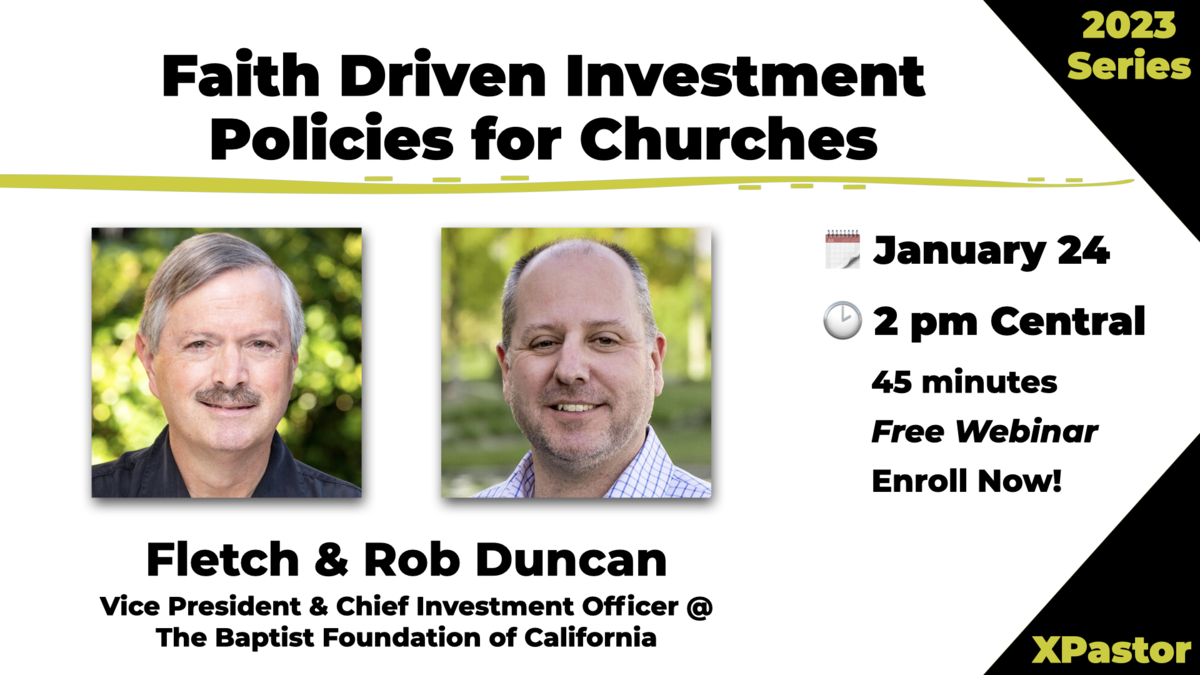Managing ministry funds is a challenging responsibility, especially during tough economic times. In response to this challenge, Evangelical Christian Credit Union (ECCU) has published a number of articles on liquidity in Ministry Banking Today, a monthly e-publication. These articles have been edited and compiled in this resource paper to help you more effectively manage your ministry’s funds during the current economic downturn and beyond.
Economic Indicators Suggest a Drop in Giving
As the one who manages ministry finances, what does the current economic situation mean for you? “From our experience, this would suggest that donations will be down across the board,” says Mark Jones, ECCU’s senior banking consultant. He says now is the time to respond, before a drop in giving forces you to react.
Assessment: Look Back
Economic realities play out differently around the country. Before making adjustments, Jones recommends assessing your ministry’s economic environment. Think about the people who financially support your ministry and answer questions like:
- How are the economic conditions affecting them?
- Are they losing their jobs or facing layoffs? Salary freezes?
- Do they rely heavily on investment income or home equity?
Your assessment should also review historical and current giving patterns. How have your people responded during past downturns? Even if your giving is on the rise, could present trends slow or stop that growth?
Forecast: Look Ahead
An assessment puts national trends in local context, which equips you to do a cash flow forecast. “The goal,” Jones says, “is to avoid having to make rash decisions down the road, like cutting staff, because of cash flow issues you could have avoided by acting now.”
Proactive steps you might take run the gamut from controlling discretionary expenses to cutting budgets to postponing capital expenditures. An important hedge against a potential drop in giving is adequate cash reserves. “With adequate reserves, you’re better positioned to weather this storm,” Jones says. Without reserves, he says the worst-case scenario could become your reality. “If a ministry doesn’t start adjusting now, they’ll be forced to cut back on programs and ultimately mission fulfillment.”
Liquidity Management
“Do we have enough cash to cover expenses?” The question alone elicits anxiety, especially for donor-based ministries with constantly fluctuating cash flow. So, with eyes squeezed tight and prayers whispered, ministries may ignore the practice of liquidity management and hope for the best.
Why is it important?
Liquidity management is the practice of managing finances in a way that allows ministries to meet their financial obligations and accomplish their mission. Without adequate financial resources, ministries can be distracted from mission accomplishment to cope with financial pressures. No wonder it’s so important.
Careful liquidity management is often overlooked due to a false sense of security. What appears to be large cash balances can lead ministries to believe they have sufficient cash, forgetting that unexpected expenses—the loss of a key donor, or an unanticipated program opportunity—will quickly expose inadequate resources.
The need for liquidity arises from the fact that daily cash inflows seldom equal expenses. For example, ministries predictably experience a dip in donations during the summer, right when expenses are usually the highest. And impacts on cash flow often happen without warning, causing financial pressures.
Ministries with inadequate liquidity are likely to delay payments to vendors or lenders, tarnishing their reputation and costing additional funds and time to manage the situation. In more serious cases, inadequate liquidity can cause salary delays, layoffs, or suspended mission programs.
Fortunately, there are ways to prepare for the unexpected and properly manage liquidity.
How much is enough?
When it comes to cash flow, one thing is certain: day-to-day income and expenses are unsynchronized and sometimes unpredictable. However, by determining transaction, precautionary, and speculative requirements, you can forecast liquidity needs.
Transaction requirements are the funds needed to meet planned expenses, such as payroll. Start by looking at your budget for expected expenses during a specific period of time. Experts also recommend preparing a cash flow forecast by examining changes or anticipated changes to the budget and determining realistic income and expenses. Compare your forecast to actual cash reserves to ensure that adequate funds are available for transactional expenses.
Precautionary requirements are cash reserves needed to pay for unplanned expenses. Anticipate events that might impact income or expenses, and then quantify appropriate reserves if such events were to occur. You can also identify the life span for capital items (such as HVAC systems, roofs, or carpet) and set aside funds to ensure cash is available when it’s time to replace them.
Speculative requirements are funds needed to pursue unplanned opportunities. With cash reserves, your ministry can respond to events such as Hurricane Katrina or hiring that key staff member who unexpectedly becomes available.
Once you’ve calculated the funds needed to meet your transaction, precautionary, and speculative requirements, then set aside that amount in cash reserves and short-term investments. If you find that you don’t have adequate cash, develop a plan to reach your target liquidity balance. You may also want to consider utilizing a line of credit to meet your liquidity needs.
Transaction, precautionary, and speculative requirements are usually based on your ministry’s history. It’s also good to talk with other ministries and financial experts, such as ECCU, to learn from their experience. Above all, resist the temptation to ignore liquidity management; it is too important to the successful fulfillment of your ministry’s mission.
Keep Ministry Flowing When Your Cash Isn’t
“When cash flow decreases, it can be like throwing a wrench in the ministry machinery,” says Mark Jones. With the prospect of giving declining, Jones advises ministries to take a look at their economic environment and cash flow forecast to ensure appropriate reserves are maintained. But what should you do once the analysis is done and the proper level of reserves is determined? Ministry Banking Today (MBT) asked Jones for his best tips on building those reserves to keep ministry running smoothly.
MBT: What are the most effective ways to begin building reserves?
Jones: Once ministries have calculated the funds needed to meet planned and unplanned expenses and opportunities, they should set aside that amount in cash reserves and short-term investments.
MBT: Is it ever a good idea to use credit to boost reserves?
Jones: Certainly. In fact, there are several reasons it doesn’t make sense for all reserves to literally be the ministry’s money. For one, there may not be that much cash to set aside. Or, there may be a number of great ministry needs or ideas which those funds could be used for.
MBT: So, how can ministries safely tap into credit when appropriate?
Jones: Establishing a line of credit (LOC) with a financial institution is one way to reach an “adequate” level of reserves without using all ministry money to do it. Picture a bucket that, when full, contains adequate reserves for your ministry. If half the money in that bucket is actual ministry funds, invested wisely, the other half can be a LOC that is only drawn upon as needed.
MBT: When is it a good idea for ministries to take advantage of their LOC?
Jones: Let’s say, for example, that it’s a high expense month and actual cash reserves are getting low. Armed with the data pulled together for the cash flow forecast, the ministry knows that using their LOC now makes sense because giving is likely to increase next month.
MBT: Are there other benefits to using an LOC?
Jones: Sure. It minimizes anxiety, ministry goes uninterrupted, and the ministry’s cash management is characterized by good stewardship. And, for those who struggle with the notion of indebtedness, most LOCs have an “evergreen” clause that requires them to be paid in full at least once every twelve months.
Confidently Concentrate Your Cash
Turns out, some of the things we learn as kids do stick, like the adage, “Don’t put all your eggs in one basket.” While this may be sage advice, it does not always apply to short-term investments. If your “basket” is backed by a solid, resource-oriented relationship and years of financial stability, you may want to start stockpiling those eggs. This was one of several insights we picked up from a conversation about cash concentration with Mark Jones.
MBT: Some say it can actually be a good idea to concentrate your cash. Why?
Jones: A good relationship with a financial institution is important to the long-term success of your ministry. Experts say concentrating your cash in one institution can be a wise investment in that relationship.
MBT: What issues should ministries consider when investing more than the insured amount in a single financial institution?
Jones: Preservation of principal is key. While it is common to have funds in excess of deposit insurance limits at financial institutions, periodically take a closer look at your institution to ensure its viability and safety. Meet with a representative of your institution at least annually to review its financial strength.
MBT: What should ministries specifically look for during this review?
Jones: Two factors: Asset quality and capital. Most of a financial institution’s assets are loans. While you can’t evaluate each loan, you can look at loan losses (net charge-off ratio) and delinquency. Are these within normal ranges for financial institutions? Also, you can see if they have the recommended capital ratio (capital available to cover losses from loans or operations).
MBT: What if ministries want to invest without exceeding the insured amount?
Jones: First, I encourage ministries to really assess the risk involved. If, after assessing the strength of your financial institution, your ministry still feels the need to not exceed the deposit insurance limit, there are ways to structure your accounts without having to maintain relationships with multiple financial institutions. The best approach is to utilize an account that sweeps excess balances into U.S. Treasuries daily. This allows you to maintain your full relationship with one financial institution, simplifies the management of your funds, and provides the highest level of safety available. However, the return is typically lower than money market accounts or certificates.
MBT: What additional “perks” should ministries look for when choosing a financial institution in which to concentrate their cash?
Jones: I can’t emphasize enough the importance of a personal relationship. Not only is it the basis for assuring safety and security, it is also a better foundation than rate for cash concentration decisions. The October 30, 2007, issue of Banc Investment Daily says, “Chances are your bank is all about service. If this is true, why do you even bring up rate? Why not track service?” If your banking institution over delivers on a resource-oriented relationship, cash concentration is a non-issue. They should know your ministry well enough to make personalized recommendations—such as how much liquidity you need and what percentage of income you should invest.
View the original PDF: Managing Ministry Funds











